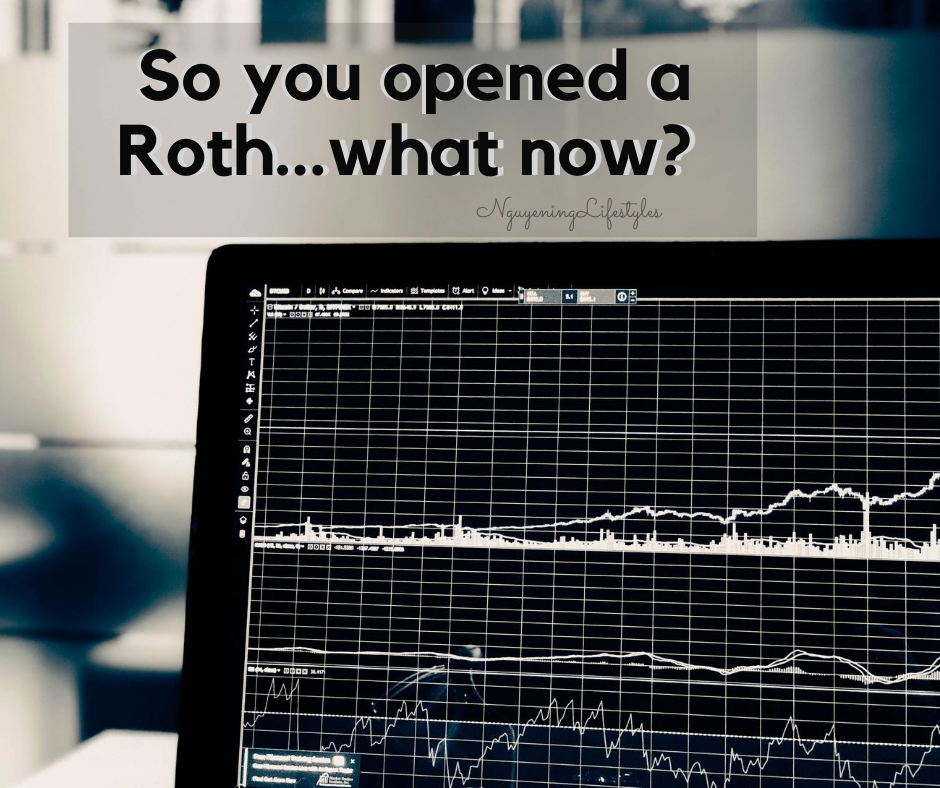So you opened a Roth IRA...what next?
Written By: Nick Nguyen | Read full profile
This post contains affiliate links which means if you click on a link and choose to make a purchase I may receive a commission at no additional cost to you. You are not obligated to do so, but it does help fund these blogs in hopes of bringing value to you! See our disclaimer for more information.
CONGRATS! You’ve taken the first step towards building wealth!
...just...make sure you buy some kind of investment with it...
Your Roth IRA is meant to buy equities and securities. This is a fancy way of saying stocks, bonds, REITs, ETFs, and index and mutual funds. These represent some kind of underlying asset (remember an asset is something you buy that has value and can generate more money for you) and will continue to go up in value over time. Okay that was a general statement. Bonds are a bit different. these are a way for you to give the government a loan, and they’ll pay you back with a little extra interest, but you get the point.
Roth IRAs are only valuable if you actually put the money in them into an asset! The only difference between a Roth IRA and a regular brokerage fund is that any of the gains you make in there aren’t taxed when you take them out!
You know how your bank account may pay you some small percent interest for leaving your money with them? The highest I could find as of August 2020 was 1.5%. Well, if you had a TON of money in your account and you were earning several hundreds to several thousands of dollars in interest in those accounts, that 1099-INT you get at the end of the year is meant to tell the IRS, “yo, this person got a lot of money from this account, make sure you charge them tax on it.”
But when you put it in a Roth IRA, you basically created a shield that prevents the IRS from coming in and saying “hey, that $1000 you just earned from all your Apple shares? Yeah, we’re going to take 15% of that.”
Cool, so you know that you need to use that money in your Roth to buy something. But, what do I buy? How will I not lose money?
Well, chances are you’ll lose money sometimes, but history has shown that the world keeps advancing. Over the last decade, the economy has gone up by an average of 6-10% each year. That means if you just put your money into index funds that track all the stocks and bonds in the U.S. economy (or even the world), you could let your money go up by 6-10% each year!
If you started in March of 2020 and invested everything into the S&P 500, your money would’ve increased by 50% today!
And did I mention this has a compounding effect? What that means is that if your $1000 became $1100 in year 1, you would then earn 10% of $1100 in year 2! That’s $10 more dollars than the first year. (This isn’t exactly how your stocks will increase in value over time, but you get the idea - the money you earn will also earn more money. This example here is specific to any dividends you may earn from your stocks).
So moral of the story? If you want to mitigate risk, look into Target Date Retirement Funds that do the work of asset allocation for you or stick your money in low cost index funds! That way you don’t have to pick individual stocks, you can just own them all!
Check out my other blogs linked below to learn more about what these are and how you can take advantage of them!
*Nguyening Lifestyles is not a registered financial service provider and does not give financial advice. All information in these posts are for entertainment purposes only. Nguyening Lifestyles is not liable for any actions or outcomes that transpired after your reading of the following post.
Recommended Posts:








